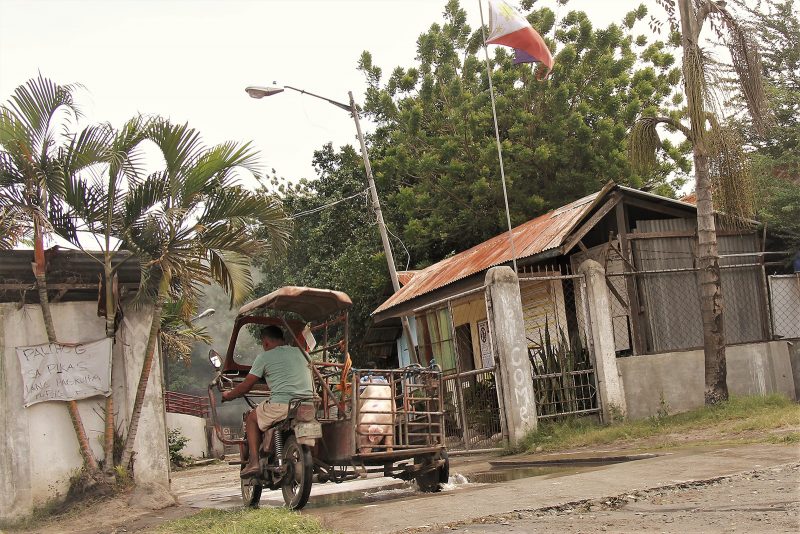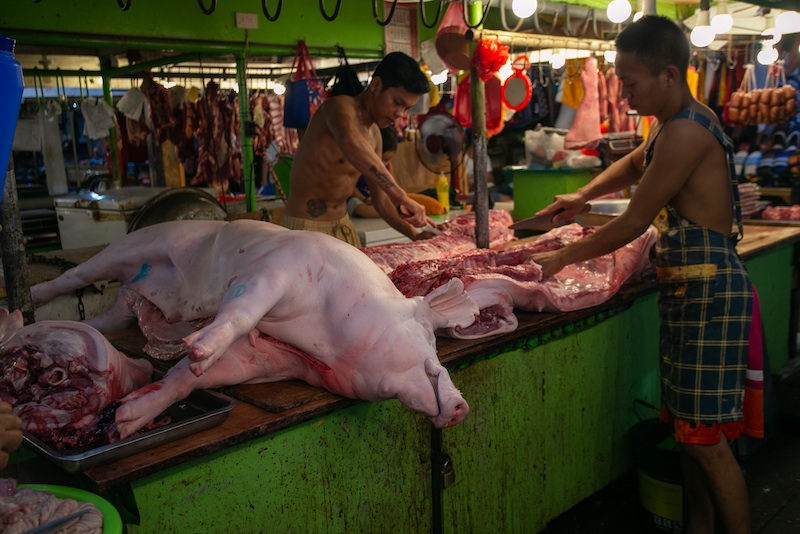GENERAL SANTOS CITY (MindaNews / 06 May) – A ranking official of the Department of Agriculture (DA) on Wednesday said local government units, including this city, must already start activating their respective local price monitoring councils over a noted rise in the prices of pork.
Assistant Secretary Noel Reyes, DA spokesperson, said the LGUs are in a best position to closely monitor prices and to undertake “intervention measures” to thwart any attempt by unscrupulous individuals to manipulate prices.
 In this file photo taken 13 February 2020, a tricycle carrying a pig enters the General Santos City Abattoir. Officials said they slaughter 80 heads daily, down from the 100 they used to butcher before the outbreak of ASF. ROMMEL G REBOLLIDO
In this file photo taken 13 February 2020, a tricycle carrying a pig enters the General Santos City Abattoir. Officials said they slaughter 80 heads daily, down from the 100 they used to butcher before the outbreak of ASF. ROMMEL G REBOLLIDO
Speaking over local radio, Reyes said that based on reports there is enough pork supply in the region, but noted that a current surge in demand in the National Capital Region may affect the stable price situation here.
This city is a major pork supplier in that region.
Reyes said the continued spread of African Swine Fever (ASF) in many part of the country caused pork supply in the country to drop.
The official’s pronouncement came after local authorities here joined hands with the private sector to protect a multi-billion pesos hog industry from threats of collapse due to the highly communicable ASF and a foreseen stiff competition with a possible surge in pork imports.
Only last month, this city was placed on a virtual lockdown, preventing the entry of live hogs, pork and related products through Executive Order No. 15 issued by the city mayor.
Dr. Antonio Ephraim Marin, head of the City Veterinary Office (CVO), said they already have tightened measures along known entry points that may be used to bring in live hogs and pork products, especially those coming from other regions in Mindanao.
Part of these efforts is the increased number of personnel of the veterinary office, now numbering 82, and additional checkpoints fully equipped with necessary instruments, chemicals and bunkhouses to keep checkpoints manned on a 24-hour cycle.
Already, these checkpoints have on several occasions turned back truckloads of hogs from supposedly “Green Zone” areas in Mindanao, for lack of the required laboratory findings and pertinent documents declaring the hog shipments as truly ASF-free, Marin said.
Aside from these, veterinary personnel here have stopped an attempt to sneak in at least 2.5 tons of frozen and processed pork products, supposedly shipped from Cebu via Davao City.
 Meat vendors prepare pork cuts at the Agdao Public Market in Davao City on 3 February 2020. Davao City Mayor Sara Duterte has ordered a ban on the entry of pigs and pig products from Davao Occidental and Davao del Sur following the presence of African Swine Fever in Don Marcelino, Davao Occidental. MindaNews photo by MANMAN DEJETO
Meat vendors prepare pork cuts at the Agdao Public Market in Davao City on 3 February 2020. Davao City Mayor Sara Duterte has ordered a ban on the entry of pigs and pig products from Davao Occidental and Davao del Sur following the presence of African Swine Fever in Don Marcelino, Davao Occidental. MindaNews photo by MANMAN DEJETO
“The fact that it was transshipped via Davao is already reason enough to seize and dispose of these pork products,” said Dr. Rex Calub, head of the CVO Meat Inspection Division.
The owner of the shipment, whose name he did not disclose, operates a processing plant in Cebu and in Davao City.
Calub said they are also closely watching pork and pork products like tocino and sausages, even already cooked pork and lechon entering the city via online selling.
They have so far confiscated at least 75 kilos of these, including several lechon being sneaked into the city.
Marin said they are in close ties with the private sector in the city, like the South Cotabato Swine Producers Association, “whose members are very supportive in our efforts to prevent the entry of ASF in Gensan.”
The P8.5-billion swine industry in this city has a population of 400,000 heads at any given time with 40,000 in sow level. It directly employs at least 2,000 workers, aside from those that rely on its downstream industries, like feed mills, meat shops, and corn farmers.
“We must always be on our toes in ensuring that this huge hog industry in Gensan be protected as well as provide affordably the requirements of consumers,” remarked Elmer Catulpos, president of the General Santos City Chamber of Commerce and Industry Inc.
The city is now the largest swine supplier in Mindanao and Visayas and the third in the whole country, he said.
Chester Warren Tan, president of the National Federation of Hog Farmers, said this is one reason they are very apprehensive about the possible outcome of a government’s move to hike hog imports.
Tan, in a phone interview, said that agriculture officials could have done better in recommending an overly huge amount in the minimum access volume (MAV) of imports from 54,000 metric tons (MT) to 404,000 MT, far from what is realistically needed by consumers even at peak demand.
He said they are not against the move to increase the MAV, but it should be on a realistic level, “Wala naman talagang malaking shortage. Like 120,000MT will already be enough.”
Tan, who owns a hog farm in Gensan, was in agreement with Catulpos who said that while the additional importation will bring down cost to benefit consumers, it will hurt the local industry if done wantonly and without proper basis.
Agriculture Secretary William Dar has proposed an expanded volume of imported pork to 404,000MT, a measure that he said will reduce rising food prices and address a possible inflation.
The import proposal shall cover pork imported under MAV scheme. Imports within the MAV ceiling are charged 30 percent tariffs while identical products beyond the MAV quota pay 40 percent.
The move eventually ended with President Duterte signing Executive Order 128 at a time when the 18th Congress already started its two-month break, effectively reducing tariffs but triggering apprehension among local traders and hog farm owners.
Tan said what they fear is that importing more than what is needed may eventually cripple the domestic hog industry, because with stiff competition brought by cheaper imports, local producers may fold up business. (Rommel G. Rebollido/MindaNews)
